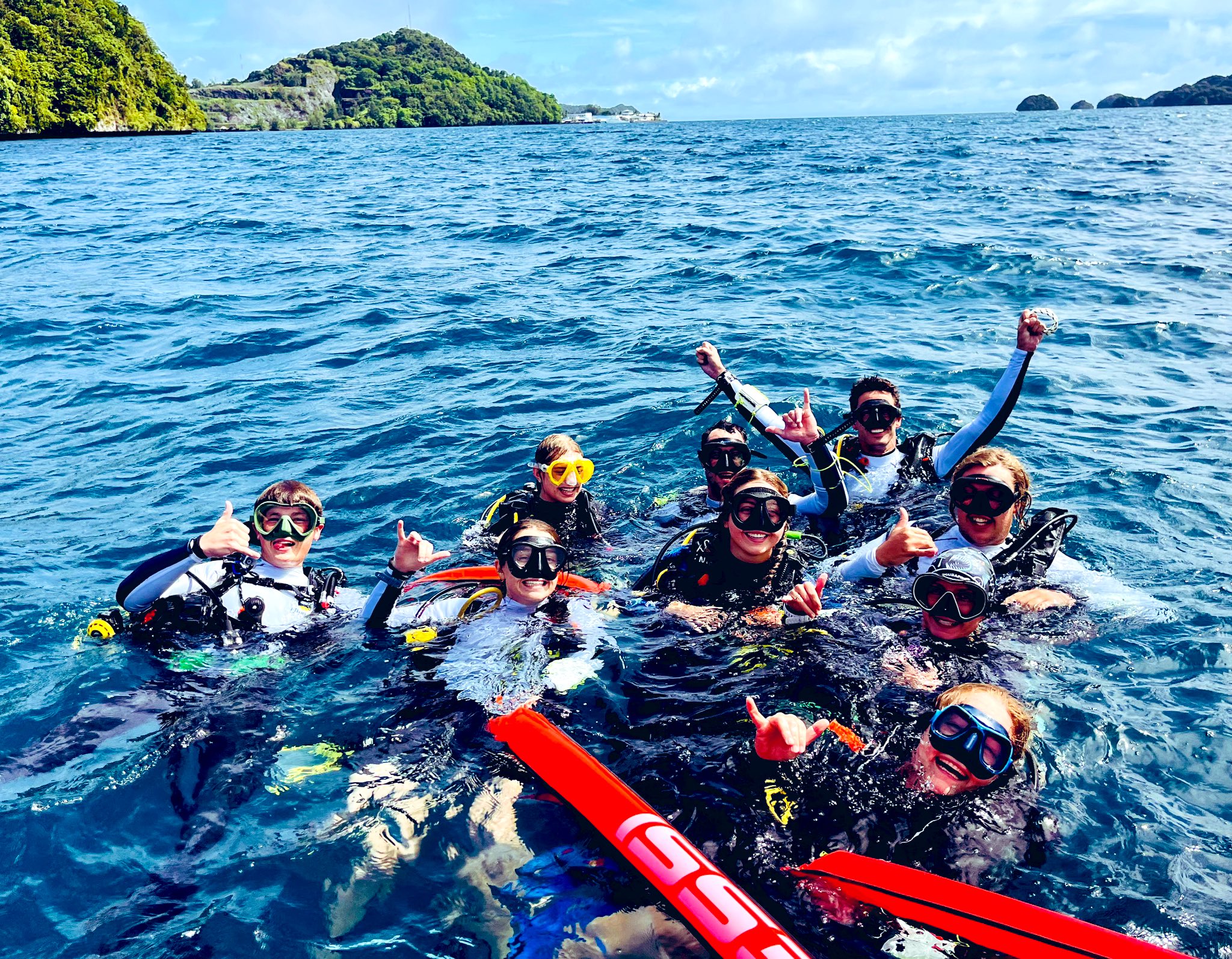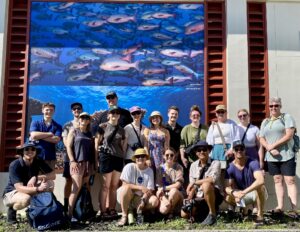
A team of Flinders University Marine Biology and Animal Behaviour students helped deliver a marine conservation education program on the Pacific Island of Palau, thanks to New Columbo Plan funding – and similar opportunities for success are now being granted to six more New Colombo Plan projects being led by Flinders University.
Flinders Deputy Vice-Chancellor (Research), Professor Raymond Chan, is delighted that the Australian Government has offered Flinders University more than $638,000 for a fresh round of New Colombo Plan funding to support six innovative cross-cultural student projects.
“Our history of successful projects underlines the importance of New Colombo Plan funding to build international collaborations for Flinders University in countries including China, the Maldives, Fiji, Palau and the Philippines – and to offer fantastic opportunities for Flinders students,” says Professor Chan.
The achievements of the Flinders team which went to Palau for two weeks in December 2023, led by Professor Charlie Huveneers from the College of Science and Engineering, has now been selected by the Australian Government Department of Foreign Affairs and Trade (DFAT) and its support service team to be profiled on the DFAT website. You can see the DFAT profile here: https://www.dfat.gov.au/people-to-people/new-colombo-plan/news/australian-students-learn-critical-conservation-skills-palaus-world-first-shark-sanctuary

Professor Huveneers says the 15 students involved in this New Colombo Plan project gained cultural experience, learned about local marine ecosystems, the Palauan conservation ethos and gained new scuba-diving skills – in addition to helping teach young Palauan high school students about marine conservation.
“Such recognition highlights the great benefits that students receive through travelling in the Asia Pacific to expand their knowledge and skills through practical experience,” says Professor Huveneers. “It recognises the quality and unique opportunities that Flinders provides for its students.”
Flinders University’s successful 2024-25 New Colombo Project leads include Dr Louisa Matwiejczyk, who will lead an interprofessional project providing Community Health, Nutrition and Physical Activity Placement in Fiji. It will take final-year Flinders Bachelor students from Health Sciences, Human Nutrition, Nutrition & Dietetics and Exercise Science on a 16-day Health Study Tour and Placement in Fiji, in partnership with the University of South Pacific, Ministry of Health and non-government agencies. Following a study program with health experts in Suva and field trips, students will commence a program of cultural immersion in a rural village, staying with local families and contributing towards health-related activities.
Dr David Hobbs and Dr Thomas Vincent will lead Engineering Internships in Singapore, involving Work Integrated Learning Placements that will embed 14 Flinders students for five-months with project partners including Nanyang Polytechnic, Fourier Intelligence and Vue Networks. Singapore has positioned itself as a technology hub of international significance and is especially known for its exceptional engineering capability – evident through its thriving ecosystem of research and development, dynamic start-up scene, and seamless integration of digital solutions into various aspects of daily life, such as Vue Networks’ VR systems.
Associate Professor Carl Mooney will lead a Software Engineering Project in India, providing Flinders students with a three-week intensive program at Rajagiri School of Engineering and Technology, focussing on both academic studies and South Indian culture. Workshops on network security, cybersecurity and block chain technology will be supported by industrial visits to see how this technology is applied in Indian business. The Flinders students will also design and build their own tech project in collaboration with Rajagiri students.
Dr Jessica Genauer, senior lecturer in International Relations and Political Science at Flinders, will lead a two-week study tour in Hanoi for Flinders students to research a Vietnam-based leadership, governance and diplomacy scenario, applying problem solving, disaster management and crisis diplomacy skills to respond. The study tour, delivered in partnership with the Diplomatic Academy of Vietnam and involving activities with DAV students, will run twice – in 2024 and in 2025 – with nine participants in each cohort.
Dr Nicholas Godfrey, senior lecturer in Screen at Flinders University, will take students to Hong Kong for an immersive short-term field trip to focus on transformative new technologies in screen production. Flinders students will collaborate with their peers at the Hong Kong Academy for Performing Arts (HKAPA)to develop a short film concept, which will ultimately be produced on location in both Hong Kong and Adelaide.
Professor Chris Hay will lead “Fringe to Fringe: Performing the Indo-Pacific”, for which Flinders drama students will embark on a three-week field trip in Singapore to focus on Indo-Pacific performance and theatrical culture. Students will undertake workshops with Singaporean practitioners and local students through the Singapore University of Technology and Design, then participate in the M1 Singapore Fringe Festival, a leading regional festival that presents the best contemporary innovative and socially-engaged works to Singapore. On their return to Australia, the students will perform in the Adelaide Fringe Festival.

